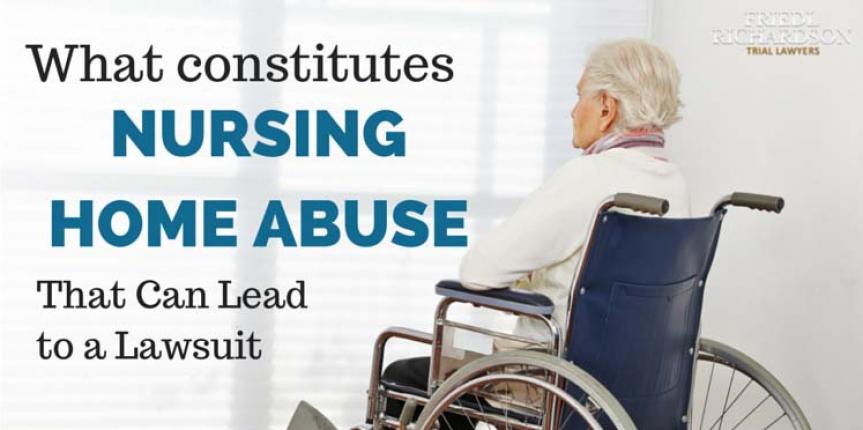What Constitutes Nursing Home Abuse that Leads to a Lawsuit
90 percent of U.S. nursing homes do not have enough staff to provide adequate care.
Further, the National Center on Elder Abuse states that while 58 percent of suspected elder abuse cases were categorized as "neglect" cases, the remaining 42 percent involved serious physical, emotional, sexual and financial abuse.
What Constitutes Nursing Home Abuse?
The U.S. Administration on Aging defines elder abuse as:
- Any intentionally negligent act by caregivers or other individuals that causes a serious risk of harm or direct harm to a "vulnerable adult".
- Physical abuse that inflicts injury or pain on an elderly person (slapping, hitting or restraint by chemical or physical means)
- Non-consensual sexual contact of any kind
- Emotional abuse when someone is deliberately inflicting mental anguish, distress or pain on a senior citizen
- Exploitation (financial abuse), or the illegal appropriating, concealing or misusing of assets, property or funds belonging to a senior citizen for the benefit of another
Abandonment of an elderly person who is not self-sufficient may be considered a form of abuse but is more likely to be deemed "neglect". Neglect differs from abuse because the harm inflicted on the elderly person is considered as "negligent", "willful" or "inadvertent". Failing to attend to the needs of a dependent senior to the extent that physical and/or mental harm befalls the elderly person could be considered medical negligence and/or abuse and subject to litigation.
Protecting Loved Ones from Nursing Home Abuse
Signs exhibited by patients who may be suffering abuse by nursing home staff include:
- Bruises, scratches or other skin irritations that cannot be explained by staff or the nursing home resident
- Fractures that seem suspicious or unusual for the situation
- Development of bedsores
- Uncharacteristic behaviors presented by the nursing home residents--depression, aggressiveness, agitation, unreasonable anger, crying and an unwillingness to talk (non-responsiveness)
- Resident always appears disheveled, unkempt or smells unwashed
Signs of sexual abuse may involve:
- Visible scratching and bruising around the person's genital area and breasts (for women)
- Seeming anxious and fearful all the time
- Unexplained bleeding in the genital area
- Extreme behavioral changes, especially clinical depression, panic and anxiety
Financial abuse is another form of frequently seen nursing home abuse affecting residents when a staff member illegally obtains cash, property or assets belonging to the resident to use for his or her personal gain. What often happens when a senior is financial abused involves a staff member tricking or cajoling the senior into giving him/her access to their checking or savings account by claiming to want to "help" the resident.
What To Do If You Suspect Nursing Home Abuse
Confronting the nursing home administration may or may not elicit the response you expected. Some will take immediate action by initiating an investigation and firing the suspected staff member or members involved in the neglect or abuse. Unfortunately, the bad publicity resulting from allegations of abuse often prevent nursing homes from taking aggressive steps to stop the abuse. Instead, they may deny it, claim they will correct the situation or minimize the extent of the abuse.
Reporting the abuse to your local Adult Protective Services usually gets law enforcement involved, especially when physical or sexual abuse is alleged. When elder abuse causes a nursing home resident to suffer significant physical and/or emotional harm that presents permanent or chronic issues, then it is time to contact a medical malpractice lawyer to ensure all guilty parties involved received the maximum punishment available by law and the victim is justifiably awarded with the compensation needed to pay for all medical bills, pain and suffering.






